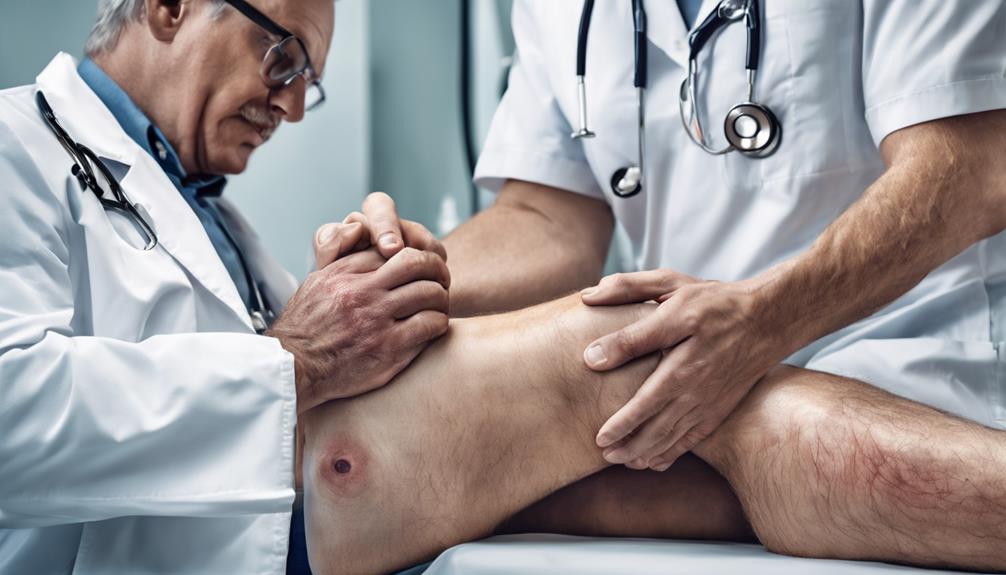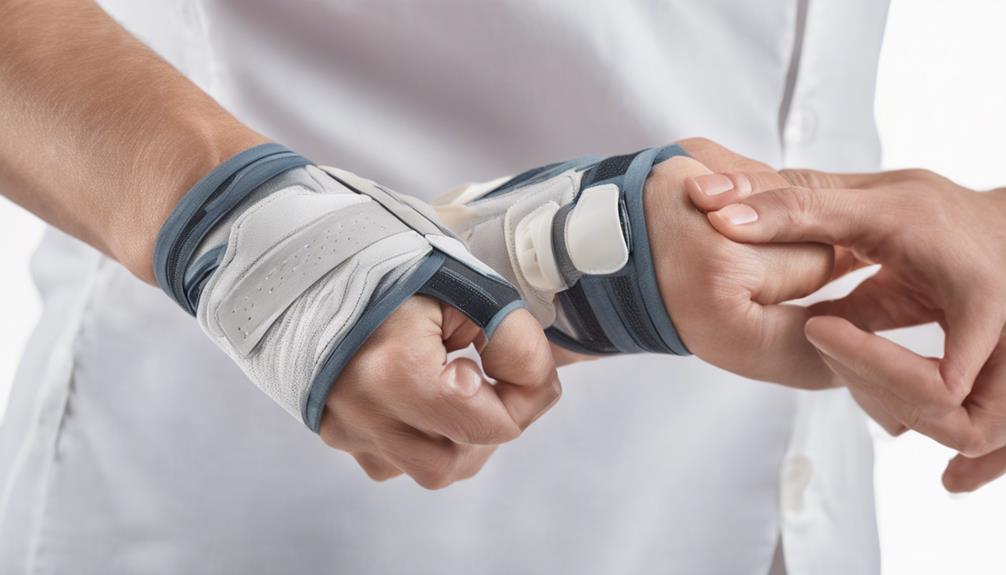Let’s delve into the intricacies of ICD-10 Septic Arthritis, akin to solving a intricate medical puzzle. Comprehending this ailment surpasses a superficial understanding; it necessitates a sharp focus on details and accuracy in diagnostic coding.
As we venture into the realm of infectious arthropathies, the intricacies of differentiating reactive from postinfective arthropathies come to light, setting the stage for a deeper exploration of the importance of accurate coding.
Stay tuned as we uncover the critical role proper coding plays in the realm of healthcare management and patient care.
Key Takeaways
- Accurate bacterial identification crucial for coding septic arthritis.
- Utilize specific ICD-10 codes and include B96 for bacteria.
- Precise documentation essential for proper reimbursement and care.
- Compliance with coding guidelines enhances accuracy and patient outcomes.
ICD-10-CM Coding Overview
When assigning ICD-10 codes for septic arthritis, we must ensure accurate identification of the specific bacterial etiology to facilitate appropriate treatment. In the case of septic arthritis with hand involvement, utilizing the ICD-10-CM code M00.849 is crucial. This code specifically addresses arthritis caused by other bacteria and is essential for precise diagnosis and treatment planning. Additionally, it's recommended to include an additional code, B96, to specify the exact bacteria responsible for the infection.
ICD-10-CM code M00.849 falls under the broader category of infectious arthropathies due to microbiological agents. Proper coding of septic arthritis not only aids in accurate diagnosis but also plays a significant role in ensuring appropriate reimbursement for medical services. Understanding the nuances of ICD-10-CM coding for septic arthritis is paramount for effective medical documentation and billing processes. By meticulously assigning the correct codes, clinicians can streamline the diagnosis and treatment of septic arthritis, ultimately benefiting patient care and outcomes.
Specific Septic Arthritis Codes

The specific ICD-10-CM codes for septic arthritis provide detailed classification based on the affected site and bacterial etiology. Proper coding of septic arthritis is crucial for accurate diagnosis and billing. Here are key points to consider:
- M00.80: Used for septic arthritis at an unspecified site.
- M00.829: Designated for septic arthritis caused by other specified bacteria.
- M00.862: Specifically for septic arthritis affecting the left knee.
When assigning ICD-10 codes for septic arthritis, it's essential to include additional code B96 to identify the specific bacteria responsible for the infection. This additional information ensures precise tracking of joint infections and facilitates appropriate medical treatment.
Understanding the nuances of septic arthritis codes in ICD-10-CM is vital for proper documentation and reimbursement. By accurately documenting the affected site and the causative bacteria, healthcare providers can streamline the coding process and optimize patient care.
Documentation and Billing Guidelines
To ensure accurate reimbursement and treatment planning for septic arthritis, precise documentation of the bacterial cause is essential. Proper documentation plays a pivotal role in the diagnosis and management of septic arthritis. Healthcare providers must accurately record all relevant clinical information, including the specific bacterial cause, to facilitate coding accuracy and appropriate treatment planning.
Billing guidelines for septic arthritis necessitate the use of specific ICD-10 codes to ensure proper reimbursement for services rendered. Understanding the nuances of documenting septic arthritis not only aids in coding accuracy but also streamlines the billing process, ultimately enhancing healthcare administration efficiency.
Compliance with documentation and billing guidelines is paramount for healthcare facilities to operate smoothly and provide quality care to patients with septic arthritis. By adhering to these guidelines, healthcare professionals can contribute to improved patient outcomes and overall healthcare system effectiveness.
Importance of Accurate Coding

Accurate coding for septic arthritis in ICD-10 is imperative to ensure precise diagnosis and appropriate reimbursement. Proper coding not only aids in identifying the specific bacteria causing septic arthritis but also helps in understanding the infection source. Compliance with coding guidelines is essential for maintaining accurate medical records of septic joint cases.
- Utilizing additional codes like B96 assists in pinpointing the causative bacteria responsible for septic arthritis.
- Including external cause codes may be necessary to determine the source of the infection leading to septic arthritis.
- Adhering to coding guidelines enhances compliance and ensures the quality of medical records, ultimately improving patient care for individuals with septic arthritis.
Tips for Proper Coding
Regularly reviewing and implementing updated coding guidelines is crucial for ensuring precision in documenting septic arthritis cases. When assigning the ICD-10 code for septic arthritis due to other bacteria in the elbow, it's essential to use M00.80.
Additionally, incorporating the additional code B96 to identify the specific bacteria causing the infection is necessary for accurate coding and billing purposes. Proper documentation is key in differentiating septic arthritis from other forms of arthritis to avoid coding errors and ensure appropriate treatment.
Staying informed about coding changes and revisions is vital to maintaining accuracy in medical documentation and reimbursement claims. By adhering to coding guidelines and documenting the details meticulously, healthcare professionals can facilitate seamless communication between providers and accurately reflect the complexity of septic arthritis cases in the healthcare setting.
Frequently Asked Questions
What Is the ICD-10 Code for Septic Arthritis?
The ICD-10 code for septic arthritis is M00.9, falling under infectious arthropathies. It's crucial to use additional codes like B95-B97 to specify the infectious agent.
Septic arthritis, joint inflammation from infection, is a serious condition. Accurate coding is essential for diagnosis, treatment, and reimbursement. Understanding the specific ICD-10 code aids in managing this debilitating condition effectively.
What Is Septic Arthritis?
Septic arthritis is a serious joint condition stemming from an infection. It causes pain, swelling, and restricted movement. Timely diagnosis and antibiotic treatment are vital to prevent lasting joint harm.
The primary culprit of septic arthritis is bacterial invasion. Risk factors include age, prior joint injuries, immune compromise, and existing joint problems. Quick action is key to halting its progression and safeguarding joint health.
What Is the ICD-10 Code for Septic Prosthetic Arthritis?
When addressing the ICD-10 code for septic prosthetic arthritis, it's crucial to utilize T84.50XA. This code pinpoints infections and inflammatory responses linked to internal joint prostheses.
Proper coding ensures accurate documentation and billing for treatment. Remember, T84.50XA necessitates additional characters to specify the affected joint and laterality, aiding in precise identification and care planning.
What Is the ICD-10 Code for M17 11?
The ICD-10 code for M17.11 is osteoarthritis of the knee, right knee, with other specified pathological fracture.
It's crucial to accurately assign this code to ensure proper tracking and management of cases involving this specific condition.
Correct documentation and coding are essential for effective diagnosis and treatment planning.
Timely identification of osteoarthritis with associated fractures aids in providing appropriate care and preventing further complications.
Conclusion
In conclusion, accurate coding for septic arthritis is essential for effective patient care and reimbursement.
Just as a skilled surgeon meticulously sutures a wound to promote healing, precise coding ensures the proper treatment and management of this infectious arthropathy.
By following documentation guidelines and utilizing specific ICD-10-CM codes, healthcare providers can successfully navigate the complexities of diagnosing and treating septic arthritis, ultimately improving patient outcomes.









